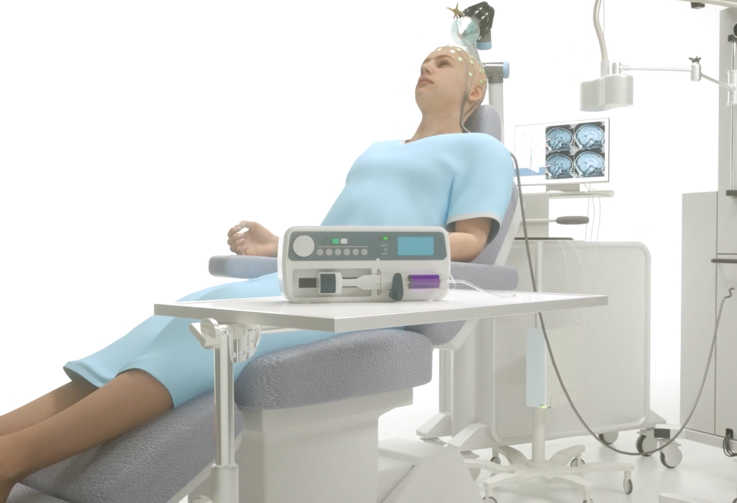MSc Thesis / Semester Project: Real-time control of focused ultrasound intensities using passive cavitation imaging (PCI): applications to targeted drug delivery

Figure 1: Future clinical concept for our technology.
Project:
Non-invasive, focal drug delivery in a controlled, reliable manner can lead to breakthroughs in the treatment of brain disorders. We recently developed a unique technology based on focused ultrasounds that can concentrate small molecules in target brain regions orders of magnitude more efficiently than systemic drug administration [1]. This has important applications for the treatment of chronic brain diseases, but also opens new opportunities for the non-invasive interrogation of brain circuits in large animal species.
To translate this technology to the clinic, we recently received a Bridge Discovery award [2] which will support further validation of our technology in large animals, and eventually humans. In this context, we are looking for a master student to help the development of algorithms and hardware for the real-time control of ultrasound intensities delivered to brain tissues, using acoustic feedback received from intravenous drug carriers. This system will be critical to the success of our technology, ensuring maximally-effective drug delivery while avoiding harmful sonication regimes. The student will be working within a large interdisciplinary team consisting of neurosurgeons, veterinary scientists, neuroscientists, and engineers. This is a unique opportunity to get exposed to cutting-edge, translational work in the field of neurotechnology.
Tasks:
-
- Familiarizing with focused ultrasound hardware and software, as well as drug-carrier physics.
-
- Development of a passive cavitation imaging (PCI) readout for the spatially-resolved monitoring of cavitation events.
-
- Development of a feedback control algorithm using readout from PCI to adjust delivered ultrasound intensities in real-time.
-
- In-vitro validation of the algorithm in the presence of ex-vivo human/sheep skulls.
Tasks will be adapted based on the student’s time and interests.
Pre-requisites:
-
- Strong motivation.
-
- Familiarity with common benchtop electronic equipment (e.g. oscilloscopes, amplifiers, function generators).
-
- Good understanding of signal processing basics as well as control theory.
-
- Experience with Python/MATLAB programming.
Project duration: 6-9 months, July 1st, 2024 (earliest start).
Contact: Please reach out to Jad Hanna (jahanna (at) ethz.ch) via email with CV and transcripts attached.
References:
[1] Ozdas, M.S., Shah, A.S., Johnson, P.M. et al. Non-invasive molecularly-specific millimeter-resolution manipulation of brain circuits by ultrasound-mediated aggregation and uncaging of drug carriers. Nature Communications 11, 4929 (2020). https://doi.org/10.1038/s41467-020-18059-7
[2] https://ee.ethz.ch/news-and-events/d-itet-news-channel/2022/12/prof-mehmet-fatih-yanik-and-his-team-receive-the-bridge-discovery-award.html